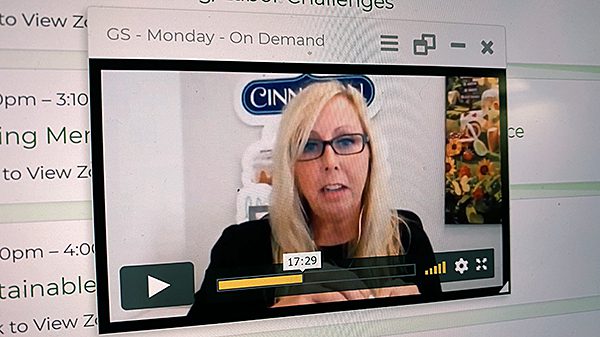Anissa Mandell Chase, senior vice president, supply chain at Focus Brands LLC., talks during a Foodservice Delivered panel discussion.
A panel of foodservice executives kicked off the Produce Marketing Association’s BB #:153748 Foodservice Delivered conference with a view from the large chain business.
While many restaurant operators have been challenged with the shutdown and gradual reopening, some chains have taken the challenges in stride, by turning them into opportunities to streamline the business.
“I think our business will never be the same, and that’s okay,” said Anissa Mandell Chase, senior vice president, supply chain at Focus Brands LLC. “Change is imperative for survival and for a minute there we were all surviving, and it was a very difficult time.”
If anything, supplier relationships have strengthened for chains like Focus Brands, which includes restaurants like Schlotzky’s, Moe’s Southwest Grill, and Jamba Juice.
“For us it also reinforced for benefit of chain business. For a minute there we weren’t necessarily valued customers because chain businesses is typically viewed as a low margin business and usually highly demanding business,” she said. “But now I think buyers and distributors are looking at that and saying, okay, these 10 concepts helped us sustain our business during that downturn.”
For Shake Shack, the challenge of labor and social distancing created an opportunity to reevaluate the menu.
“So that meant that we couldn’t execute everything that was normally on our menu and we got rid of some of those slow movers,” said Lisa Kartzman, vice president of supply chain for Shake Shack.
Cheesecake Factory, on the other hand, decided to continue with its voluminous menu.
“That’s what our customers expect of us, yes we did do some things differently,” said Hari Nagabhirava, senior vice president of global supply chain. The business did make changes, including adapting to more to-go orders, a move the company plans to integrate into new locations going forward.
For Chipotle, the pandemic has meant expansion, said Carlos Londono, vice president and head of supply chain. The company expects to hire 10,000 new employees by the end of the year. Maintaining those employees is mission critical, he said.
“We’re doing a lot to try to make sure that our people in the restaurant, our crew members as we call them, have an excellent experience, and can develop their careers within our organization,” he said.
The full session is available on demand in the Foodservice Delivered platform. Click here to login and watch.
A panel of foodservice executives kicked off the Produce Marketing Association’s BB #:153748 Foodservice Delivered conference with a view from the large chain business.
While many restaurant operators have been challenged with the shutdown and gradual reopening, some chains have taken the challenges in stride, by turning them into opportunities to streamline the business.
“I think our business will never be the same, and that’s okay,” said Anissa Mandell Chase, senior vice president, supply chain at Focus Brands LLC. “Change is imperative for survival and for a minute there we were all surviving, and it was a very difficult time.”
If anything, supplier relationships have strengthened for chains like Focus Brands, which includes restaurants like Schlotzky’s, Moe’s Southwest Grill, and Jamba Juice.
“For us it also reinforced for benefit of chain business. For a minute there we weren’t necessarily valued customers because chain businesses is typically viewed as a low margin business and usually highly demanding business,” she said. “But now I think buyers and distributors are looking at that and saying, okay, these 10 concepts helped us sustain our business during that downturn.”
For Shake Shack, the challenge of labor and social distancing created an opportunity to reevaluate the menu.
“So that meant that we couldn’t execute everything that was normally on our menu and we got rid of some of those slow movers,” said Lisa Kartzman, vice president of supply chain for Shake Shack.
Cheesecake Factory, on the other hand, decided to continue with its voluminous menu.
“That’s what our customers expect of us, yes we did do some things differently,” said Hari Nagabhirava, senior vice president of global supply chain. The business did make changes, including adapting to more to-go orders, a move the company plans to integrate into new locations going forward.
For Chipotle, the pandemic has meant expansion, said Carlos Londono, vice president and head of supply chain. The company expects to hire 10,000 new employees by the end of the year. Maintaining those employees is mission critical, he said.
“We’re doing a lot to try to make sure that our people in the restaurant, our crew members as we call them, have an excellent experience, and can develop their careers within our organization,” he said.
The full session is available on demand in the Foodservice Delivered platform. Click here to login and watch.
Pamela Riemenschneider is the Retail Editor for Blue Book Services.



